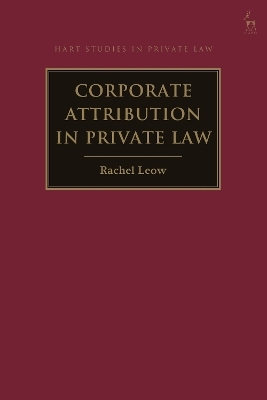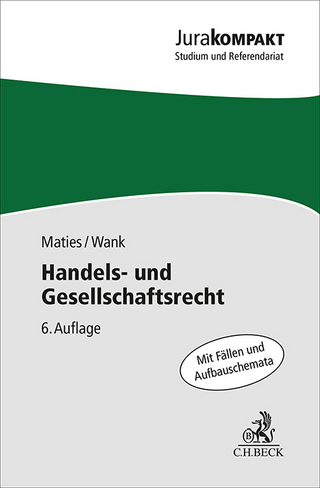
Corporate Attribution in Private Law
Hart Publishing (Verlag)
978-1-5099-4182-7 (ISBN)
Corporate attribution is the process by which the acts and states of mind of human individuals are treated as those of a company to establish the company’s rights, duties, and liabilities. But when and why are acts and states of mind attributed in private law?
Drawing on a wide range of material from across the disparate areas of company law, agency law, and the laws of contract, tort, unjust enrichment, and equitable obligations, this book’s central argument is that attribution turns on the allocation and delegation of the company’s own powers to act. This approach allows for a much greater and clearer understanding of attribution. A further benefit is that it shows attribution to be much more united and coherent than it is commonly thought to be. Looking at corporate attribution across the broad expanse of the common law, this book will be of interest to lawyers across the common law world, including the United Kingdom, Australia, Canada, and Singapore.
Rachel Leow is Assistant Professor at the National University of Singapore, Singapore.
1. Introduction
I. The Central Argument
II. Advantages
III. Scope
IV. Outline
PART I
FOUNDATIONS
2. Attribution as Allocated and Delegated Powers
I. Meridian Global Funds Management Asia Ltd v Securities Commission
II. Problems with existing Approaches
III. A Fictional View of Attribution
IV. A Non-Fictional Account of Attribution
V. The Account Applied
VI. Attribution as Identifying Intentional Acts
VII. Conclusion
PART II
APPLICATION
3. Attribution of Acts in Contract
I. Agency Analysis
II. Contracting by the Board or Shareholders in General Meeting
III. Contracting by Subordinate Agents
IV. Group Agency
V. Attribution and Other Routes to Liability
VI. Conclusion
4. Attributing Acts in Tort
I. ‘Vicarious Liability’ and Other Doctrines
II. The Conceptual Basis of Vicarious Liability
III. Pre-1956 Law
IV. 1956 and aft er: Development of Servant’s Tort Theory
V. The Attribution of Acts aft er 1956
VI. When are Acts Attributed?
VII. Conclusion
5. Attributing Acts in Unjust Enrichment
I. Mistaken Payments
II. Attribution Rules in Unjust Enrichment Claims
III. Payments
IV. Induced Mistakes: Representations
V. Receipt
VI. Reasons in Favour of Consistency
VII. Conclusion
6. Attributing Knowledge
I. The Current Law
II. Attributing Knowledge
III. Illustrations
IV. The Case Law
V. Conclusion
PART III
DIFFICULT PROBLEMS
7. Attribution in Enforcing Duties
I. Three Major Decisions
II. When and Why is Attribution Unavailable?
III. The ‘Both Ways’ Test
IV. The Effect of Attribution
V. Illegality
VI. Applying the Analysis to Stone & Rolls, Bilta, and Singularis
VII. Conclusion
8. Aggregation
I. Connecting Act and Knowledge
II. The ‘Knowing and Intending’ Test
III. Aggregation’s Importance
IV. Conclusion
9. Conclusion
I. Central Claims
II. The Account, Illustrated
III. Implications
IV. Tying the Threads Together
| Erscheinungsdatum | 19.04.2022 |
|---|---|
| Reihe/Serie | Hart Studies in Private Law |
| Verlagsort | Oxford |
| Sprache | englisch |
| Maße | 156 x 234 mm |
| Themenwelt | Recht / Steuern ► Allgemeines / Lexika |
| Recht / Steuern ► EU / Internationales Recht | |
| Recht / Steuern ► Privatrecht / Bürgerliches Recht | |
| Recht / Steuern ► Wirtschaftsrecht ► Gesellschaftsrecht | |
| ISBN-10 | 1-5099-4182-7 / 1509941827 |
| ISBN-13 | 978-1-5099-4182-7 / 9781509941827 |
| Zustand | Neuware |
| Informationen gemäß Produktsicherheitsverordnung (GPSR) | |
| Haben Sie eine Frage zum Produkt? |
aus dem Bereich


